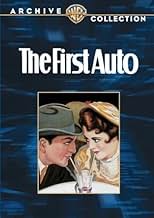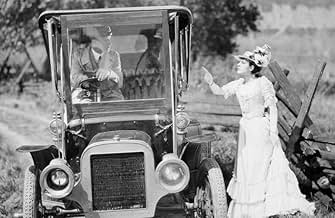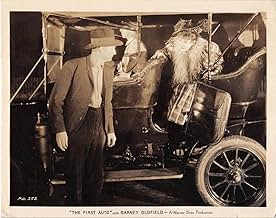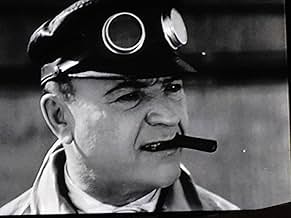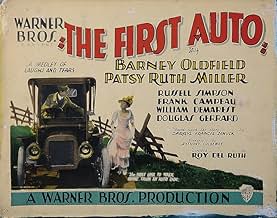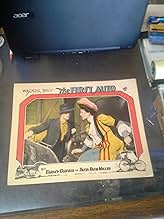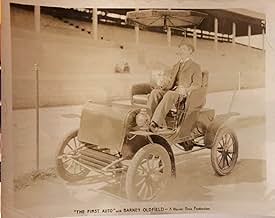Füge eine Handlung in deiner Sprache hinzuHank owns horses, stables horses and races horses. He favorite horse always wins and he is prosperous and well known. His son (Bob), however, dreams only of the future of the horseless carri... Alles lesenHank owns horses, stables horses and races horses. He favorite horse always wins and he is prosperous and well known. His son (Bob), however, dreams only of the future of the horseless carriage and not of the horse. This causes problems between Hank and Bob. As the people in the ... Alles lesenHank owns horses, stables horses and races horses. He favorite horse always wins and he is prosperous and well known. His son (Bob), however, dreams only of the future of the horseless carriage and not of the horse. This causes problems between Hank and Bob. As the people in the town convert from horses to autos, Hank detests those who switch - so he loses his friends... Alles lesen
- Regie
- Drehbuch
- Hauptbesetzung
- Bob Armstrong
- (as Chas. E. Mack)
- Joe Saunders
- (Nicht genannt)
- Livery Handler at Auction
- (Nicht genannt)
- Townsperson Who Laughs Heartily
- (Nicht genannt)
- Elmer Hays
- (Nicht genannt)
- Boy
- (Nicht genannt)
- Young Woman
- (Nicht genannt)
- Barber
- (Nicht genannt)
- Mrs. Stebbins
- (Nicht genannt)
Empfohlene Bewertungen
The beginning is light and breezy - you have a man, Hank Armstrong, with a champion race horse - 'Sloe Eyes - and a successful livery business. His son, Bob, courts a local girl and at the same time dreams of building horseless carriages. He has competition for the girl's hand - a fellow that does not like to fight fair - and he enters importantly into the plot near the end of the film. In time, father and son come to a parting of the ways when the father sees Bob's boosting of and participation in the auto business as betrayal.
There are a few interesting things to note in this film. One is William Demarest as comic relief throughout the movie. Another is Barney Oldfield playing himself. Finally there is the bizarre fact that the fellow who plays Bob died in an automobile accident at the age of 27 during the time this film was being made. If the ending seems a bit incomplete or unsatisfactory because of his absence, this is the reason.
*** (out of 4)
Hank Armstrong (Russell Simpson) is a lover of horses. He breeds them, races them and cares for them more than he does his own son (Charles Emmett Mack). Our story runs from 1895-1905 as we see the horses being put out of business by the "horseless carriage" and we see Hank fall apart as he refuses to let go and accept where the future is going. There's a lot of nice stuff in this film, which would turn out to be the sixth movie Warner would release with sound effects and a musical accompaniment. I personally find these effects to be quite distracting and to me they never really add much to a film except for an early part of sound history. Another negative thing is that this silent movie has more inter-titles than any other film I can think of. There was a time when we were reading more than watching so needless to say there was too many but this might have been done due to a tragedy that happened during filming, which I'll mention later. Outside of those issues this is a very pleasant film that manages to be both funny, touching and quite silly at the same time. The highlight of the movie is a scene where the rich family in town get their new car and decide to take it out for a spin. After reading the instructions on how to drive, dad takes off and soon hell breaks loose. We've seen this type of scene before but it's handled so well here you can't help but laugh. Another memorable scene happens early one when Hank's favorite horse dies giving birth and he "rides" her into Heaven. This scene could have been a disaster but it works quite well and manages to be very sweet even though I'm curious what they did to the horse to get it to remain so still. The performances are all pretty good and that includes Simpson who is almost too good because his character is such a jerk that it's hard to gain sympathy for him. Patsy Ruth Miller, who most will remember from THE HUNCHBACK OF NOTRE DAME, is also pretty good and it's fun seeing Barney Oldfield, a major name in early autos. The tragic side to this film is that Charles Emmett Mack, a discovery of D.W. Griffith, was on his way to film the racing scenes at the end of the movie when his car was struck by a farm truck and he was decapitated. It's quite ironic that this would happen while on the way to film the racing scenes.
This is a patchwork of a film -- part comedy (including some old vaudeville routines. William Demerest and his clown companion are present for no other reason except comic relief. In vaudeville, the clowns in front of the curtain were there to mask the noise and movement of scenery and costume changes taking place on the stage behind the curtain.) Such clowning was obviously not necessary for the movies, but it's still there -- and we get to see what people were laughing at before stand-up monologue comedy was the only game in town.
The film is part melodrama as we see how a horse in the late 1890's could be the friend and companion of the pre-industrial era, and how the death of a man's horse could bring a man to tears. "A horse is loyal. A horse remembers! A horse knows what gratitude is!" -- words spoken by the father/livery owner who is then called a "Brute" (an animal) by his son.
With it's pre-talkie talking-and-scored soundtrack, it sometimes plays like a rough experiment in early film sound technologies (which exactly parallels the story of the first automobiles -- and how quickly they displaced the horse-centered life.) Within 3 years, silent pictures were as gone from the landscape as horse-drawn buggies. The equally experimental "special effects" fire in the engine of a moving race car isn't exactly the parting of the Red Sea -- but we still get the idea.
It also has the air of a headliner news-reel -- when surprise! Barney Oldfield, playing himself, races around the horse track so that all of America (at least those who went to the movies) could see him do what he was famous for -- speed racing!
At it's heart, however, this is a story. It is about family and about learning what matters (sometimes called family values), and of generations -- a father with both feet firmly planted in the pre-automobile age, and his son who is racing after the biggest technology of the time. They loose each other, almost loose everything else, and then find each other and move into the automobile age together -- where the father opens a car dealership and goes to the car races while the son spends his days at the horse shows. -- and "gosh, what's the world coming to next?" as a bi-plane soars overhead.
This is not a "great" movie -- but it is great fun, and a great window back both to 1927 and it's time of plenty before the stock market crashed us into the Depression; and to the 1927 recollection of 1896, when the lights of technology were just beginning to turn on. It is a wonderful piece of film history, now preserved for my great- and great-great grandchildren. --Thanks to all those doing film preservation -- we love it.
The story is not that dramatic. It feels as inevitable as the spread of the automobile. It's a little like Hank. I also wonder if this was financed by Ford. Early real racer Barney Oldfield has a minor role. I've never heard of the name but it's interesting to learn something. The old car racing is quite compelling. It has a recklessness about it although I would definitely get rid of the fake flames. The effect looks bad. This is an easy story and probably more compelling for people who lived through the era.
Wusstest du schon
- WissenswertesCharles Emmett Mack died in a car crash on his way to the studio four months prior to the release of this completed film, though he was not on his way to shoot a car chase to this film as has been often reported. Because of this unfortunate occurrence, when the film eventually was released, cast credits were rearranged, placing Barney Oldfield in top position, even though he only had a relatively short appearance in the film, and Mack was quietly placed in the bottom position, even though he was the star. [The credits for the version shown on TCM lists "Chas. E. Mack" third from the bottom with Oldfield listed last.]
- PatzerMr. Stebbins receives a letter from his insurance company canceling his policy dated 1897, but his car is a 1906 model.
- Zitate
Opening Title Card: Once upon a time, a horse was a horse... and was loved as such. This was even before Dan Patch started breaking records, or the Vanderbilt cup races had come to displace the county fair. The latest thing then was a bicycle built for two... Bryan hadn't been heard of... and a nickel was still respected -...
- Crazy Credits"A Romance Of The Last Horse And The First Horseless Carriage"
- VerbindungenEdited into Gadgets Galore (1955)
- SoundtracksIn My Merry Oldsmobile
(1905) (uncredited)
Music by Gus Edwards
In the score during the opening credits, at the end and as background music
Top-Auswahl
Details
- Laufzeit
- 1 Std. 15 Min.(75 min)
- Farbe
- Sound-Mix
- Seitenverhältnis
- 1.33 : 1

